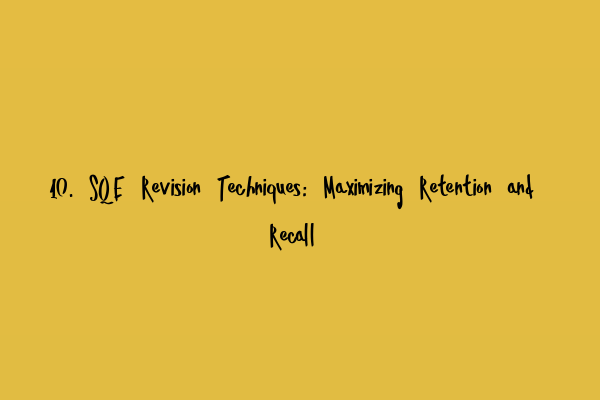SQE Revision Techniques: Maximizing Retention and Recall
Preparing for the Solicitors Qualifying Exam (SQE) can be overwhelming, considering the vast amount of legal knowledge you need to retain and recall during the exam. However, with the right revision techniques, you can maximize your retention and recall abilities, ultimately improving your chances of success. In this article, we will explore ten effective SQE revision techniques that will help you master the material and perform your best on exam day.
1. Create a Study Schedule
One of the first steps in effective SQE revision is to create a study schedule. Organizing your study time and sticking to a consistent routine can help you stay focused and avoid cramming at the last minute. Break down your revision into manageable chunks, allocate specific time slots for each topic, and be sure to include regular breaks to prevent burnout.
2. Use Interactive Mock Tests
Interactive mock tests are an invaluable resource for SQE preparation. They not only allow you to gauge your understanding of the topics but also enhance engagement and learning. By simulating exam-like conditions, mock tests help you familiarize yourself with the question format, time constraints, and the overall stress of the actual exam.
3. Focus on Key Concepts
While it’s essential to cover all the topics in the SQE syllabus, focusing on key concepts will help you grasp the foundational principles of each area of law. Understanding the core concepts will not only make it easier to recall specific details but also enable you to apply your knowledge to different scenarios. Our article on Mastering Key Concepts in SQE1 and SQE2 provides valuable insights into the areas to prioritize during your revision.
4. Practice SQE Sample Papers
SQE sample papers are an excellent way to test your knowledge and familiarize yourself with the exam format. Working through these papers under timed conditions will not only help identify areas where you need further revision but also improve your time management skills. Make it a regular part of your revision routine to gain confidence and build your exam strategy.
5. Use Active Learning Techniques
Passive reading and highlighting of study materials are not effective for long-term retention. Instead, engage in active learning techniques such as summarizing the content in your own words, teaching the material to someone else, or creating flashcards for quick revision. These techniques force you to actively process and recall information, enhancing your retention abilities.
6. Break Down Complex Topics
If you encounter a complex or difficult topic, break it down into smaller, more manageable chunks. By deconstructing the material and focusing on each component separately, you can build a better understanding of the topic as a whole. This approach will also help you connect the dots between different concepts and make it easier to recall the information during the exam.
7. Revise Regularly and Frequently
Consistency is key when it comes to revising for the SQE. Rather than cramming intensively for a few days, revise regularly and frequently throughout your study period. Spaced repetition, revisiting topics at regular intervals, has been proven to enhance long-term retention. Ensure that you leave enough time for review in your study schedule to reinforce your knowledge and prevent forgetting.
8. Utilize Visual Aids
Visual aids can be powerful tools for memorization. Consider creating mind maps, diagrams, or flowcharts to visually represent complex legal concepts. The visualization of information helps your brain make connections and improves recall. Furthermore, visual aids make your study process more engaging and enjoyable.
9. Discuss and Debate with Peers
Explaining legal concepts to others and engaging in discussions and debates with peers can deepen your understanding and retain knowledge. By verbalizing your understanding and listening to different perspectives, you challenge yourself to recall information accurately and articulate it effectively. Seek out study groups or online forums where you can collaborate and exchange ideas.
10. Adjust Your Revision Strategy
Regularly assess your performance in practice exams and adjust your SQE revision strategy accordingly. Identify weak areas that require additional attention and modify your study plan to address these gaps. Reflecting on your mock performance will enable you to fine-tune your approach and improve your overall exam readiness.
With these ten SQE revision techniques, you can optimize your study process, enhance retention and recall abilities, and increase your chances of success on the exam. Remember to stay consistent, stay focused, and believe in your ability to master the material. Best of luck on your SQE journey!
